Nervous sweat dropped from my pits as I looked down at my hands.
It was more than a decade ago, sitting across from a writing mentor; a stranger at my college who agreed to look at the memoir I was writing and help me edit it. I waited for a reaction. This was a short 8-10 page essay, in memoir form, that I had been assigned in a writing class.
I had known in my guts from an early age I needed to share my story. I knew my life and the circumstances that were like a hurricane around me had to be for a reason. There had to be purpose in the pain I endured.
She didn’t look up often, but when she did, I met her gaze. I needed reassurance. I needed someone to nod and say, “yes, you should share your story.” It didn’t happen that day, in fact, I left feeling sick to my stomach and like I was making a big mistake.
There were situations in my story where I was sexually, emotionally, and physically abused, and I can only imagine how the seemingly innocent tutor felt reading about these situations with me sitting directly across from her at a cramped table in the campus library.
She began to explain how I had gone from past to present tense and it made it confusing for the reader (I still do this). She helped me with some typos and grammatical errors, but mentioned nothing about the heart of my story.
The interaction reiterated to me how ashamed I had felt—and so, I continued to carry the load alone.
However, I needed to share my story with peers in my writing class and get feedback. The feedback was powerful and insightful, but it didn’t give me the strength or perseverance to keep writing. In truth, sharing that much and looking back at my story made me emotional, and I struggled deeply.
Bringing up past traumas and abuse can be healing, but only if we are sharing with the right trusted audience. Sharing with strangers who haven’t walked in our shoes can sometimes make us feel more alienated and different. I wanted acceptance by sharing the deep, dark parts of my past, but mostly I got brushed over by people who had more uplifting, bright, and shiny essays.
I admit that I get also uncomfortable when people share emotions with me.
I am working on this and learning to hold space. But at the same time, I can’t hold those people to blame for not knowing how to receive me sharing my vulnerability.
To be honest, my story (at that point) probably wallowed in emotionalism. I was still working through it all and it was hard to drudge it up and even harder to write it down. Sharing seemed like too much, but my heart said I needed to get it up and out. I also needed to share to show others that it’s possible to overcome childhood adversity and rise above it.
The problem was I hadn’t risen from it. I had dissociated to keep myself safe and reading what I had written brought it all to the surface too quickly. I should have been reading it to a trusted therapist and not an editor in her 20s.
I feel fortunate that a decade has passed and I feel that my healing journey has come full circle. I now have processed the pain and trauma, and I can share from a healed place. It hasn’t been easy, but I have learned to love the process of healing; peeling those layers, and getting to the root of deep wounds within.
The first time I shared an article with Elephant Journal, it was a scary experience. I had written quite a bit, 60,000 or so words to be exact. I was finally writing that memoir. I had posted some articles on a blog site but had a maximum of five readers and most were related to me. I decided to try to publish with EJ, as a few years prior a friend had recommended it. At that time, I looked and shut it down. I couldn’t do it. I wasn’t good enough and was sure my writing wouldn’t be received. I started a writing page on Facebook but had only shared it with that same core five people. Having anyone else read my writing felt overwhelming.
I hit submit on two articles to EJ that day in July, amidst Covid-19 and feeling like what the hell. I received a note from an editor that I needed to fine-tune one piece and that the other would be Grassroots (meaning they wouldn’t publish it, but I was welcome to share it with my own community).
My first published Elephant Journal article was called, “Somewhat Grateful to be a Former Meth Addict.” It was something I had written a couple of years before and was deeply personal. I felt like, what If people feel weird around me after I share this? Will my kids’ friends’ parents still let them come over? Will I lose my job in the education system? Will my husband be okay with me sharing this? What will my in-laws think of me?
A dear friend said, “you are letting the reactions of others (some people you hardly know) defer you from fulfilling your dream of being a writer. That hit hard. It was true. I was so scared of what people might think of me, I was staying in my safe little bubble—and I was pretty miserable there to be honest. I had all of this writing inside of me but was too scared to hit submit.
The day that the first article was published changed my life. It literally changed my life.
I decided to share it on my personal Facebook page and received comment after comment of love, support, and accolades. I was told I was strong and brave. People said they had no idea what I had come through. I sat and cried and cried. I released all of the fear and inhibition about my story that day.
I was accepted. I shared the deepest parts of me and I was accepted.
The next day, I walked a little taller. I looked people in the eye. I was living in my truth. I shared the darkest, yuckiest parts of my story and I was well received. I could release the shame I was carrying.
I was free for the very first time.
~
Thank you Elephant Journal, for changing the trajectory of my life and happy 19th anniversary!


 Share on bsky
Share on bsky
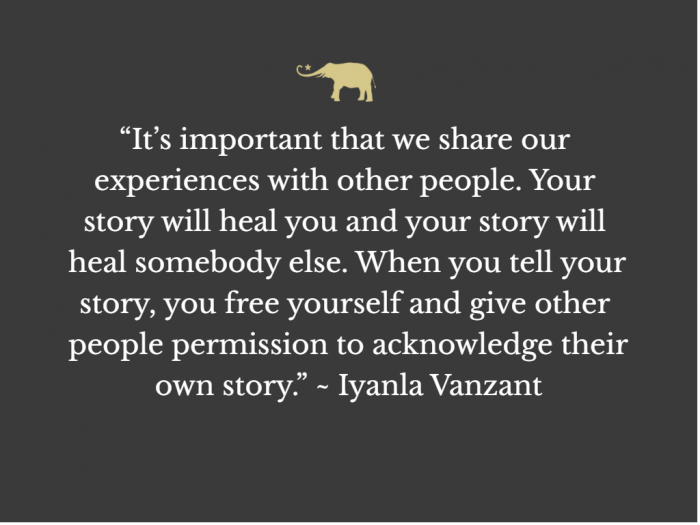
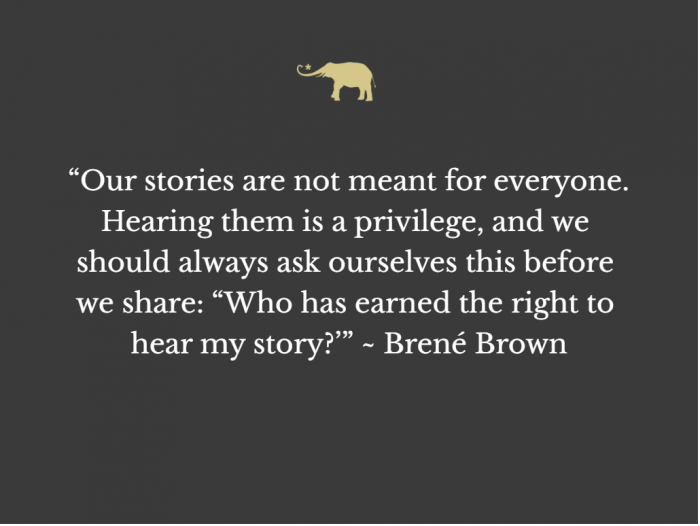
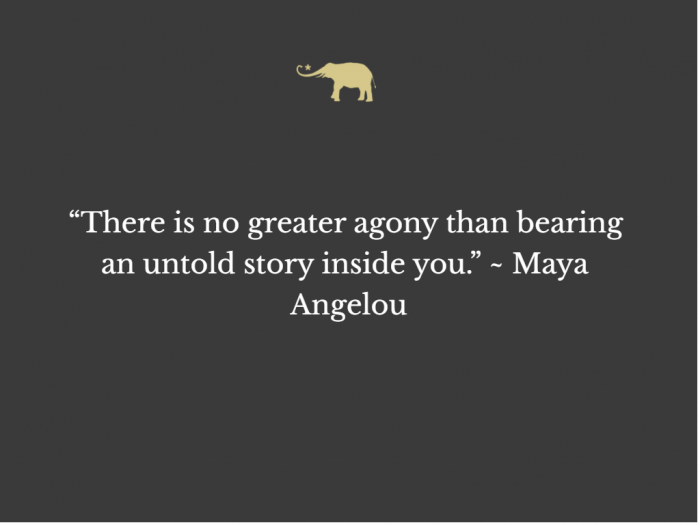
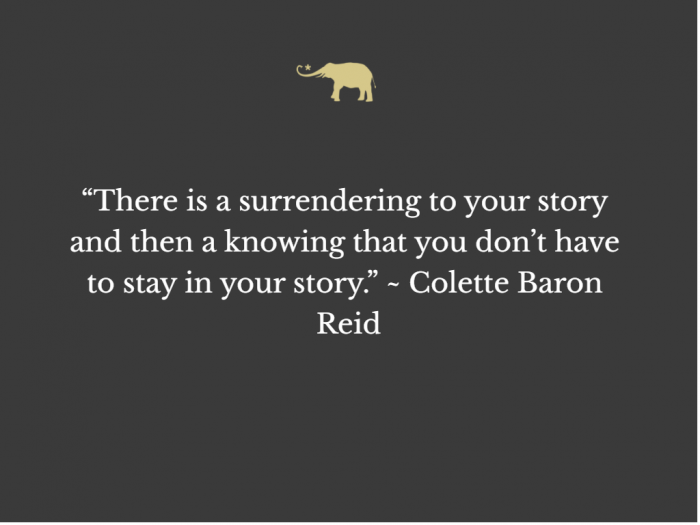
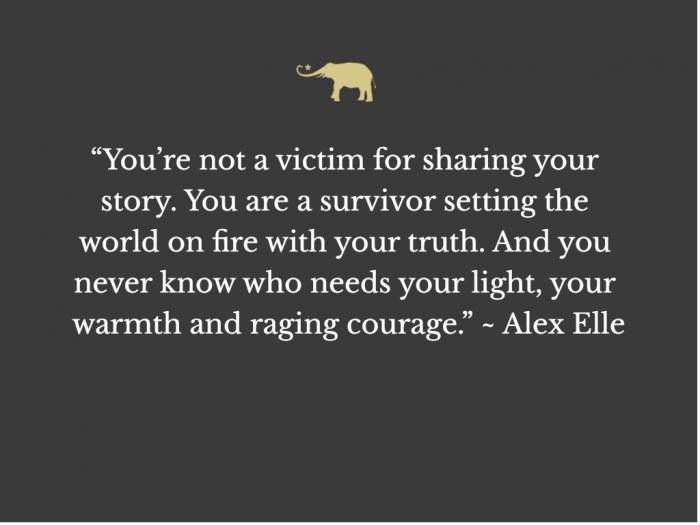




Read 37 comments and reply